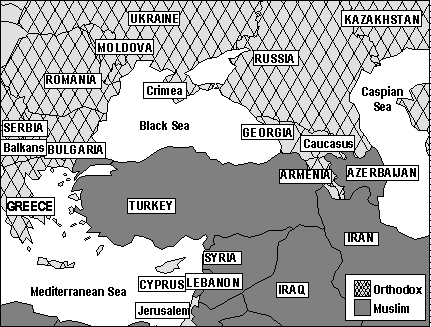
Dynamics

|
Generational Dynamics |
| Forecasting America's Destiny ... and the World's | |
| HOME WEB LOG COUNTRY WIKI COMMENT FORUM DOWNLOADS ABOUT | |
When Georgian President Eduard Shevardnadze said a couple of days ago that the country is close to civil war, it made us sit up and take notice. A civil war there could trigger a wide war that spreads to a "clash of civilizations" in several regions, including Afghanistan, Iraq and the Mideast.
Most people have heard about the possible "clash of civilizations" between Islam and Christianity, but few Americans are familiar with the fact that the most violent wars between these two religions have been between Islam and Orthodox Christianity. Orthodox Christianity is quite different from Western (Catholic and Protestant) Christianity, and in fact the wars between the Western and Orthodox Christians have been been violent as well.
There are three major historical battlefields between Islam and Orthodox Christianity, as shown on the following map:
 |
The first battlefield is in the Balkans (on the left of the map), which saw atrocities and ethnic cleansing that killed millions of people in the 1990s.
The second battlefield is the Crimea, in the middle of the map, which has historically seen many wars, including the famed Crimean War that occurred in the 1850s.
And the third major battlefield is in the Caucasus mountains, to the right on the map. Chechnya has been a battleground for years, and now we see the possibility of the Chechnyan war against Russia spreading to a much larger regional war involving Georgia.
The Caucasus mountain region has for centuries been valuable real estate, since many Asian trade routes are squeezed through this bottleneck between the Black and Caspian Seas. Therefore, whoever controls this region can also control much valuable trade. Today, this same region is as crucial as ever, since it's the site of an oil pipeline being built to carry Caspian Sea oil to Turkey.
 |
These wars have been going on for centuries, and continue to this very day. A major escalation of this type will have major ramifications, because it might draw Russia into a larger war, and will further aggravate the wars which America is currently fighting against Islamic militants to the south.
Generational Dynamics predicts that this major clash of civilizations is going to begin within the next few years, based on generational changes that have occurred since the Bolshevik Revolution in Russia in 1917 and the destruction of the Ottoman Empire (Turkey) in the 1920s.
There's no way to predict the sequence of events that will lead to this major world war, but Shevardnadze's dramatic statement wakes us up to the possibility that the next battlefield may be one we haven't really been thinking about much, up until now.